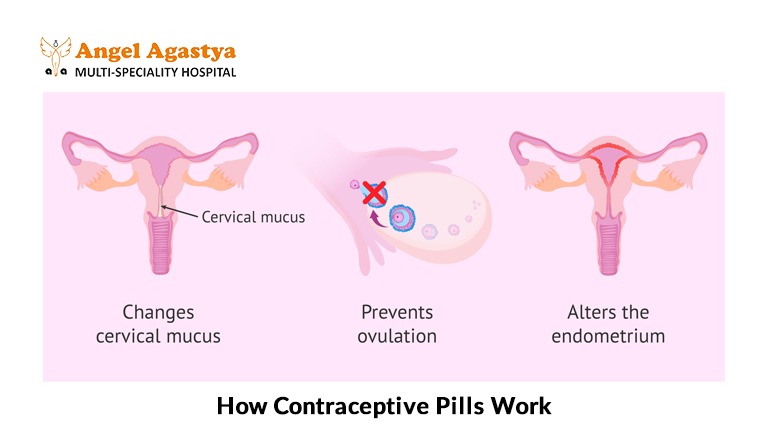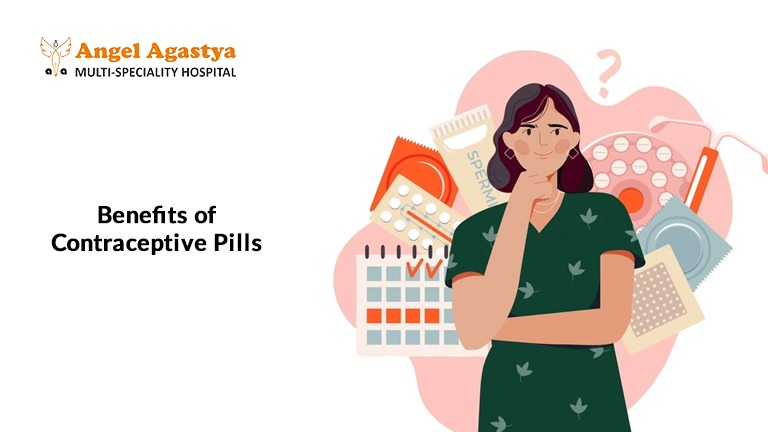Is Taking an i-pill or Any Other Contraceptive Pill Good for Health?
Think taking an i-pill is harmless? Think again! While contraceptive pills offer effective pregnancy prevention, their impact on your body goes beyond just birth control. From regulating menstrual cycles to potential side effects, here’s what every woman needs to know before popping the pill!

INTRODUCTION
Contraceptive pills are among the most commonly used methods for preventing pregnancy, offering women convenience, reliability, and greater control over their reproductive choices. Whether it’s for family planning, regulating menstrual cycles, or managing certain health conditions, millions of women rely on oral contraceptives as part of their everyday routine. These pills, when taken correctly, are highly effective and offer additional benefits beyond just contraception. They can help reduce menstrual pain, lighten heavy periods, and even improve skin conditions like acne.
Despite their widespread use, many women still have concerns about the safety and side effects of contraceptive pills. Questions often arise: Are they harmful in the long run? Can they affect fertility? What about emergency contraception like the i-pill—is it safe to use more than once? These concerns are valid and worth exploring, especially since the effects can vary from person to person.
This comprehensive guide dives deep into how contraceptive pills work, the different types available (including combination pills and progestin-only options), and the potential health benefits and risks associated with them. It also addresses the specific role of emergency contraceptive pills, such as the i-pill, and explains why they should be used sparingly and only when necessary.
Ultimately, making an informed decision starts with understanding the science, weighing the pros and cons, and consulting a qualified healthcare professional. With the right guidance, women can choose a contraceptive method that aligns with their health needs, lifestyle, and long-term goals.
How Contraceptive Pills Work
Contraceptive pills work by altering hormone levels in the body to prevent pregnancy. The way they function depends on the type of pill used.

How Contraceptive Pills Work
Contraceptive pills work by altering hormone levels in the body to prevent pregnancy. The way they function depends on the type of pill used.
- Regular Contraceptive Pills
Regular contraceptive pills contain synthetic hormones that mimic those naturally produced in the body. They are classified into:
- Combination Pills (Contain estrogen and progestin)
- Progestin-Only Pills (Mini-Pills)
These pills prevent pregnancy through: - Thickening Cervical Mucus: Makes it harder for sperm to reach the egg
- Inhibiting Ovulation: Stops the release of an egg from the ovaries.
- Altering the Uterine Lining: Reduces the chances of a fertilized egg implanting in the uterus.
Combination pills can further be categorized into:
- Monophasic Pills: Contain the same hormone levels throughout the cycle.
- Biphasic & Triphasic Pills: Vary hormone levels to mimic a natural menstrual cycle.
2. Emergency Contraceptive Pill (i-pill)
The i-pill and other emergency contraceptive pills (ECPs) contain a high dose of hormones to prevent pregnancy after unprotected sex. They work primarily by:
- Delaying or Preventing Ovulation: Prevents the release of an egg, thereby preventing fertilization.
- Effectiveness: Best when taken immediately after unprotected intercourse. The longer you wait, the less effective it becomes.
- Not for Regular Use: i-pill is not a replacement for regular contraceptive methods and should only be used in emergencies.
Benefits of Contraceptive Pills

Besides preventing pregnancy, contraceptive pills offer several health benefits:
1. Effective Pregnancy Prevention
When taken correctly, contraceptive pills are 99% effective in preventing pregnancy, making them one of the most reliable birth control methods.
2. Regulates Menstrual Cycles
Pills help regulate menstrual cycles, making periods more predictable. Women with irregular cycles often find them helpful in maintaining consistency.
3. Reduces Menstrual Pain and Flow
Many women experience lighter periods and less cramping when using contraceptive pills, leading to improved comfort during menstruation.
4. Helps in Managing Medical Conditions
Manages Medical Conditions – Doctors prescribe contraceptive pills for:
– Polycystic Ovary Syndrome (PCOS)
– Endometriosis
– Acne
– Heavy menstrual bleeding
Lowers Risk of Certain Cancers
Long-term use of contraceptive pills has been linked to a lower risk of ovarian and endometrial cancers. The protective effect can last even after stopping the pill.
Potential Side Effects and Health Considerations

While contraceptive pills provide numerous benefits, they can also cause side effects.
1. Common Side Effects
These usually subside within a few months:
- Nausea
- Breast tenderness
- Headaches
- Mood swings
- Weight fluctuations
2. Serious Health Risks (Rare but Possible)
Women with certain health conditions may be at higher risk for:
- Blood Clots – Risk increases if you smoke or have a family history of clotting disorders.
- Heart Attack or Stroke – Especially in women over 35 who smoke.
- High Blood Pressure – Some women experience increased blood pressure while on the pill.
3.Mood and Emotional Changes
Some women report feeling:
- Mood swings
- Irritability
- Depression
These emotional effects vary from person to person. If severe, switching to another birth control method may be necessary.
4.Long-Term Considerations
There is ongoing research on the long-term effects of contraceptive pill use. While no major risks have been proven, it’s essential to use them under medical supervision
i-pill Specific Considerations

The i-pill is an emergency contraceptive that contains a significantly higher dose of hormones compared to regular birth control pills. This concentrated hormone surge works effectively to prevent pregnancy when taken within a short time after unprotected intercourse. However, this high hormone content can also cause stronger and more noticeable side effects in many women.
Some of the common side effects include:
- Irregular bleeding or spotting
- Nausea and vomiting
- Breast tenderness
- Fatigue or dizziness
- Headaches
- Delayed or early periods
These effects can vary from person to person, and while they usually resolve on their own, they can cause anxiety or discomfort, especially if the pill is taken frequently.
- Repeated Use Warning: Using the i-pill multiple times within the same month can disrupt your natural hormonal balance and lead to unpredictable menstrual cycles.
- 🔄 Not a Long-Term Solution: The i-pill is designed for emergency situations only. It is not a substitute for regular contraceptive methods. For ongoing protection, it’s advisable to consider regular birth control pills, IUDs, or other doctor-recommended contraceptive methods. Always consult a healthcare professional for guidance tailored to your health and lifestyle.
Choosing the Right Contraceptive Method
Since every woman’s body is different, choosing the right contraceptive method should be based on individual health factors.
1. Consult a Healthcare Professional
A doctor or gynecologist can help assess:
- Medical history
- Lifestyle factors (smoking, exercise, diet)
- Menstrual health
2. Discuss Your Options
Contraceptive methods include:
- Hormonal Methods: Pills, patches, vaginal rings, injections, implants, hormonal IUDs
- Non-Hormonal Methods: Copper IUDs, condoms, diaphragms, fertility awareness methods
Conclusion
Contraceptive pills, including emergency contraceptives like the i-pill, are powerful tools for preventing unplanned pregnancies and managing reproductive health. When used correctly, they offer a high level of effectiveness and additional health benefits, such as regulating menstrual cycles, reducing period pain, and managing conditions like PCOS and acne. These advantages make contraceptive pills a popular choice for many women across various age groups.
However, like any medication, they are not without potential side effects and risks. Some women may experience mild symptoms like nausea or mood swings, while others might face more serious health concerns, particularly with long-term or incorrect use. The i-pill, although highly effective in emergencies, contains a higher hormone dose and is not meant for regular use. Overuse can disrupt hormonal balance and menstrual patterns, leading to health complications.
Because every woman’s body and health history is unique, it is essential to consult a qualified healthcare professional before starting any contraceptive method. A personalized approach ensures that the chosen option aligns with individual health needs and lifestyle preferences. By making informed and responsible choices, women can take confident control of their reproductive health—safely, smartly, and with peace of mind.
Frequently Asked Questions (FAQs)
1. Are contraceptive pills safe for long-term use?
Yes, most women can safely use contraceptive pills for years. However, regular check-ups with a doctor are essential to monitor any potential side effects.
2. Can contraceptive pills cause infertility?
No, contraceptive pills do not cause infertility. Fertility typically returns to normal once you stop taking them.
3. How soon after stopping the pill can I get pregnant?
Most women can conceive within a few months of stopping the pill, but it varies from person to person.
4. Does the i-pill work if I’ve already ovulated?
The i-pill works primarily by delaying ovulation. If ovulation has already occurred, its effectiveness may be reduced.
5. Can I take the i-pill multiple times in a month?
Taking the i-pill multiple times in a month is not recommended as it can disrupt your menstrual cycle and cause hormonal imbalances.
6. What happens if I miss a dose of my regular contraceptive pill?
If you miss one pill, take it as soon as you remember. If you miss more than one, follow the instructions on your pill pack or consult your doctor.
7. Can contraceptive pills protect against sexually transmitted infections (STIs)?
No, contraceptive pills do not protect against STIs. Using condoms along with the pill can help prevent STIs.
8. Do contraceptive pills cause weight gain?
Weight changes vary among women. Some may gain weight due to fluid retention, while others notice no change.
9. Can I take contraceptive pills while breastfeeding?
Progestin-only pills (mini-pills) are safe for breastfeeding mothers, but combination pills may reduce milk supply. Consult your doctor for the best option.
10. Is there a natural alternative to contraceptive pills?
Yes, fertility awareness methods, copper IUDs, and barrier methods like condoms can be natural alternatives. However, they may be less effective than hormonal birth control.

